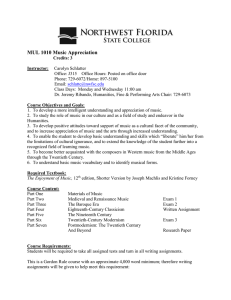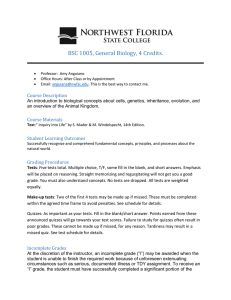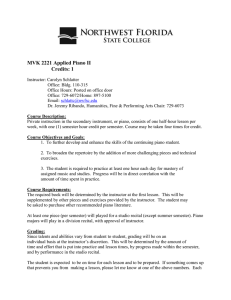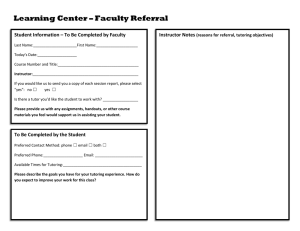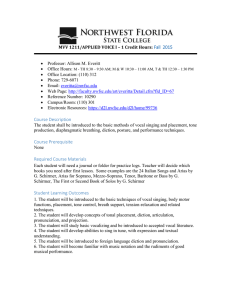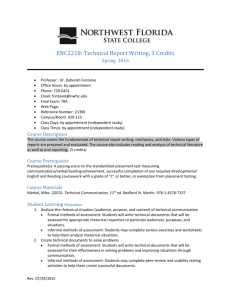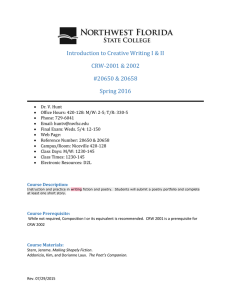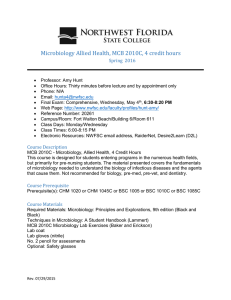MUT-1001 Fundamentals of Music Credits: 3
advertisement
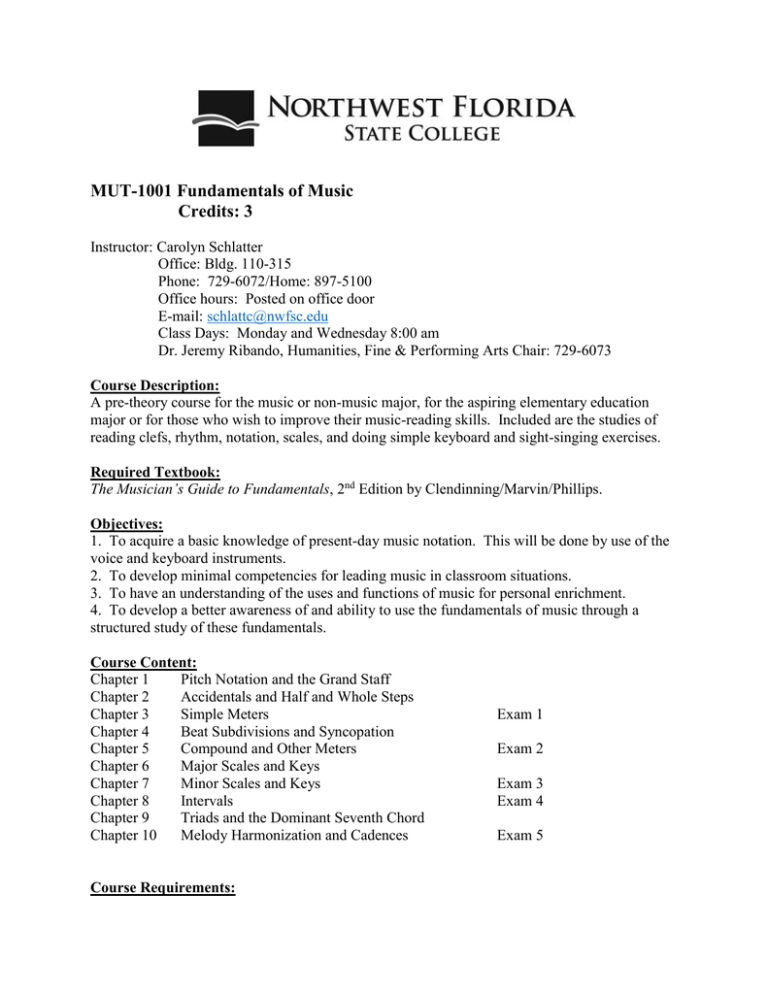
MUT-1001 Fundamentals of Music Credits: 3 Instructor: Carolyn Schlatter Office: Bldg. 110-315 Phone: 729-6072/Home: 897-5100 Office hours: Posted on office door E-mail: schlattc@nwfsc.edu Class Days: Monday and Wednesday 8:00 am Dr. Jeremy Ribando, Humanities, Fine & Performing Arts Chair: 729-6073 Course Description: A pre-theory course for the music or non-music major, for the aspiring elementary education major or for those who wish to improve their music-reading skills. Included are the studies of reading clefs, rhythm, notation, scales, and doing simple keyboard and sight-singing exercises. Required Textbook: The Musician’s Guide to Fundamentals, 2nd Edition by Clendinning/Marvin/Phillips. Objectives: 1. To acquire a basic knowledge of present-day music notation. This will be done by use of the voice and keyboard instruments. 2. To develop minimal competencies for leading music in classroom situations. 3. To have an understanding of the uses and functions of music for personal enrichment. 4. To develop a better awareness of and ability to use the fundamentals of music through a structured study of these fundamentals. Course Content: Chapter 1 Pitch Notation and the Grand Staff Chapter 2 Accidentals and Half and Whole Steps Chapter 3 Simple Meters Chapter 4 Beat Subdivisions and Syncopation Chapter 5 Compound and Other Meters Chapter 6 Major Scales and Keys Chapter 7 Minor Scales and Keys Chapter 8 Intervals Chapter 9 Triads and the Dominant Seventh Chord Chapter 10 Melody Harmonization and Cadences Course Requirements: Exam 1 Exam 2 Exam 3 Exam 4 Exam 5 Students will be required to attend class and take all assigned tests. Grading Scale: A = 90 – 100 B = 80 – 89 C = 70 – 79 D = 60 – 69 Make-up policy for exams: Make-up exams will be at the discretion of the instructor. The lowest grade will be dropped at the end of the semester. The mid-term and final exam dates will be announced. Class Attendance: Students are expected to attend all of their scheduled classes, as attendance is one of the strongest predictors of success. Students are also expected to arrive and depart on time. Note that although college policy provides for a certain number of class absences, that number covers all types of absences, including absences such as those due to documented illness or other emergency. Work missed during an absence may be accepted at the discretion of instructor. Students who stop attending class or are not able to pass the course due to attendance expectations stated in the syllabus may receive a failing grade of “FA”. An “FA” grade is a failing grade in GPA calculations and may impact the receipt of federal aid in subsequent courses. Students traveling for college approved activities will not be penalized academically but will be responsible for missed work. Cell Phones/Electronic Devices: Cell phones, pagers, and other such electronic devices must not distract from learning. Courtesy to the professor and other students requires that phones be on vibrate or silent mode during class. No student should initiate conversations, including texts, during class activities. Use of electronic communication devices during examinations or other graded activities may constitute grounds for disciplinary action; such devices must be completely out of sight during exams or other assessments. Where emergency or employment situations require access to electronic communication services, arrangements may be made in advance with the instructor. Laptops may be used for note taking, but I expect you to be adult enough not to use this as a chance to chat with friends on Facebook or other social media sites. If I see that you are abusing this privilege, you will have to take notes the “old-fashioned way”. Emergency College Closure: In the event of unusual or extraordinary circumstances, the schedule, requirements, and procedures in this course are subject to change. If the college closes for inclement weather or other emergency, any exams, presentations, or assignments previously scheduled during the closure period will automatically be rescheduled for the first regular class meeting held once the college re-opens. If changes to graded activities are required, students will not be penalized as a result of the adjustments, but will be responsible for meeting revised deadlines and course requirements. Children in the Classroom: As a courtesy to other students and the learning process, students may not bring children with them to class sessions. Health and safety concerns prohibit children from accompanying adult students in any lab, shop, office, or classroom or other college facility where potential hazards exist. If a child-related emergency means you must miss class, contact the instructor as soon as possible to determine your options. Student Rights, Responsibilities, and Academic Integrity: Students are responsible for adherence to all college policies and procedures, including those related to academic freedom, cheating, classroom conduct, computer/network/e-mail use and other items included in the Northwest Florida State College Catalog and Student Handbook. Students should be familiar with the rights and responsibilities detailed in the current Northwest Florida State College Catalog and Student Handbook. Plagiarism, cheating or any other form of academic dishonesty is a serious breach of student responsibilities and may trigger consequences which range from a failing grade to formal disciplinary action. Resources The Academic Success Center (ASC) is located in the Activities Center on the Niceville Campus. The ASC provides free learning support services such as tutoring, ESOL, and writing assistance for all NWFSC students. Individual and group tutoring is available in a wide range of subjects on a walk-in-basis and by appointment. For more information, call the ASC at (850) 729-5389 or visit the website at Free Tutoring. Reading to Learn (R2L) is a project of Northwest Florida State College designed to support students’ learning through direct instruction of reading strategies. Students may access R2L via the website Reading to Learn. Math Labs are located in the Math Building, Room 131 on the Niceville Campus and in Building 7, Room 702 on the Fort Walton Beach Campus and Room 131 at the Crestview Center. The math labs are open to all students and provide free walk-in tutoring for all mathematics courses. For lab hours, students may call the Math Department at (850) 729-5377 or visit the website at Math Lab. Smarthinking is an online, real-time tutoring offered free to students, who may access this service via RaiderNet. Open Computer Labs There are numerous open computer labs throughout the NWFSC campuses. Students may access the website for lab locations and hours at Computer lab location and hours. Testing Center Testing Centers administer college admissions tests, placement tests, proctored exams, ACT/SAT, GED, CLEP, and DSST (formerly known as DANTES). Testing Center hours may be accessed on the Testing Center website at Testing Center. Library, Online Reference Materials, and Resources The library is a comprehensive, learning resource center providing information in print, digital, and multimedia formats to support the educational objectives of the College. In addition to inhouse materials, online services and resources can be accessed through the LRC website. Library hours are posted each semester at the building entrance and on the LRC website at Learning Resource Center. Assistance for Military and Veterans Northwest Florida State College supports our military and veterans students. You may contact NWFSC Eglin AFB Education Services Building at (850) 200-4180 or NWFSC Hurlburt Center Educational Services Building at (850) 200-4190 or visit the website at Support Our Military.
